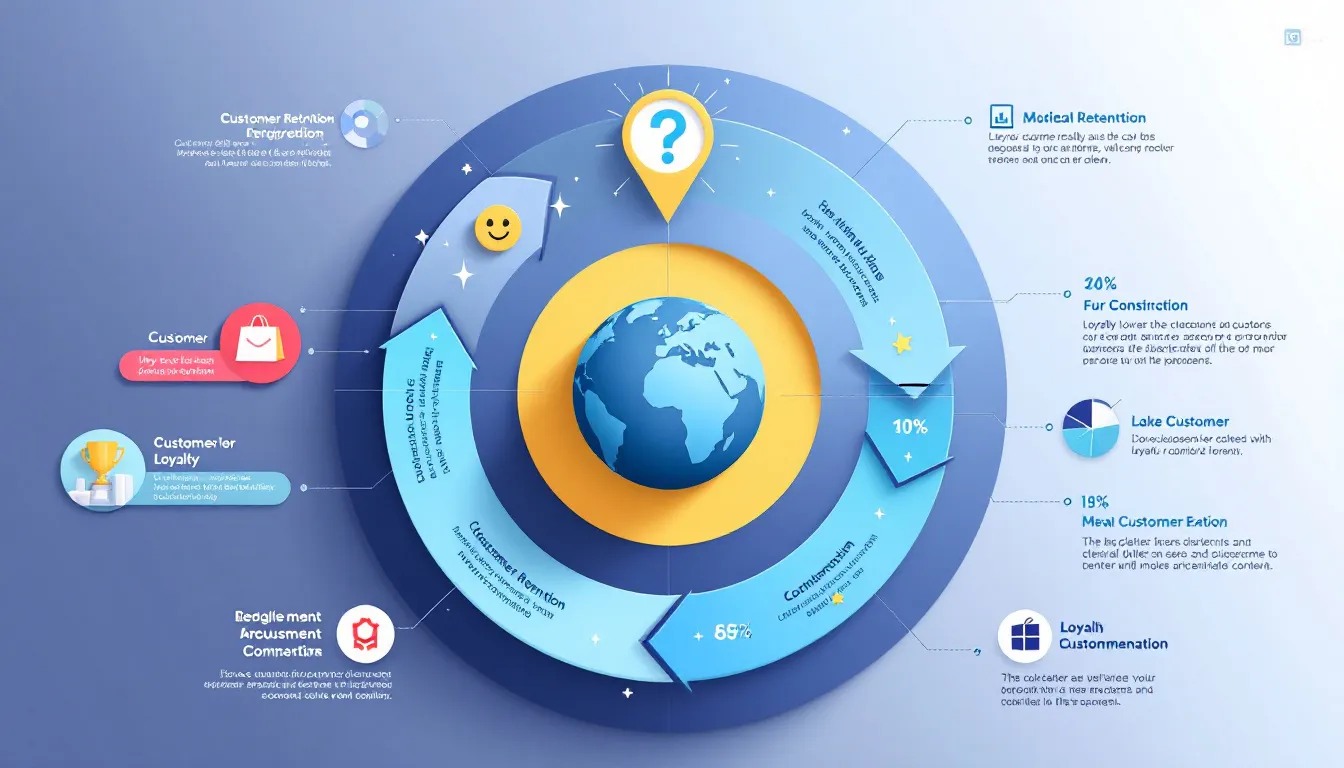Looking to improve your online sales? Learn 12 practical eCommerce business strategies in this article.
From website optimization and customer personalization to AI integration and omnichannel marketing, these strategies will help you boost your online store’s performance and increase sales.
A crucial aspect of scaling an online business is ensuring your website is built on a solid foundation. Before implementing advanced marketing strategies, it’s essential to define clear website specifications to enhance functionality, improve user experience, and support long-term growth.
Key Takeaways
- A mobile-first, customer-centric website design is essential for increasing online sales and improving user retention.
- Leveraging AI and automation enhances customer experiences through personalization, operational efficiency, and targeted marketing.
- An omnichannel marketing approach that integrates social media, email, and influencer marketing fosters customer loyalty and drives sales.
Build a Customer-Centric Ecommerce Website

A well-optimized website is the cornerstone of eCommerce success. A customer-centric approach ensures your online store not only attracts visitors but converts them into loyal customers. One of the key elements in achieving this is adopting a mobile-first design. With mobile e-commerce sales reaching $2.2 trillion in 2023, representing 60% of all online transactions, it’s clear that optimizing for mobile users is non-negotiable. Mobile-first designs offer faster loading times, improving user retention and conversion rates, and also lead to better search engine rankings as Google prioritizes mobile versions for indexing.
Creating a seamless shopping experience is crucial for keeping customers engaged. Products should be clearly segmented and categorized, making navigation intuitive and straightforward. Signs of a poorly designed eCommerce store include lacking clear value propositions and hard-to-read fonts, leading to confusing navigation. Remember, 48% of customers believe that website design influences a website’s credibility.
Personalization is another powerful tool in your arsenal. Using technology to tailor the shopping experience can significantly enhance customer engagement. For example, DS & Durga used a product recommendation quiz to enhance customer experience, while BYLT Basics reduced cart abandonment with personalized reminders based on customer feedback. These examples show how a customer-centric approach can drive eCommerce success.
Ultimately, a customer-centric website focuses on improving the entire customer journey, from the moment they land on your site to the checkout process. Prioritizing mobile optimization, seamless navigation, and personalized experiences significantly enhances customer satisfaction and boosts online sales.
Leverage Artificial Intelligence and Automation
Artificial intelligence and automation are reshaping the landscape of eCommerce, offering tools that can significantly improve customer satisfaction and operational efficiency. Chatbots, for instance, can automate customer service tasks, providing instant responses and freeing up human agents to handle more complex issues. This not only speeds up response times but also enhances the overall customer experience.
AI-driven personalization is another game-changer. By analyzing visitors’ past actions and preferences, AI can serve tailored experiences that resonate more deeply with customers, thereby increasing online sales. Imagine a customer visiting your eCommerce site and immediately seeing products that match their previous purchases or browsing history—this level of personalization can significantly boost conversion rates.
The integration of AI and automation in eCommerce doesn’t just stop at personalization. It extends to operational aspects like inventory management and marketing automation, making the entire process more efficient. For example, AI can help analyze customer data to create targeted email marketing campaigns that are more likely to convert. Leveraging these technologies allows eCommerce businesses to improve customer satisfaction and streamline operations, thereby increasing online sales.
Optimize for Voice Search and Conversational Commerce
Voice search is rapidly becoming a significant player in the eCommerce arena. With voice search e-commerce transactions increasing by over 400% from 2021 to 2023, reaching $19.4 billion, it’s clear that this technology is more than just a trend. Voice search technology relies on AI voice recognition to facilitate product searches without requiring keyboard input. This not only makes the shopping experience more convenient but also more engaging for customers.
Optimizing for voice search involves several key strategies. First, ensure your content is conversational, aligning with the natural phrasing used in voice searches. Voice search queries are often phrased as questions, so providing clear, concise answers can help improve your visibility in search engines. Engaging with Google’s Position 0, which provides direct answers to common queries, can also enhance your visibility.
Local SEO is another crucial aspect of voice search optimization. Many voice searches are used to find nearby businesses, so integrating local SEO strategies and utilizing Google My Business listings can significantly improve your local search visibility. Additionally, optimizing page speed is essential, as slow-loading pages can deter users conducting voice searches. Search engine optimization strategies can further enhance these efforts.
Finally, consider integrating AI-driven shopping assistants to further enhance the customer experience. These assistants can guide customers through their shopping journey, answer questions, and even provide personalized recommendations. Optimizing for voice search and conversational commerce creates a seamless shopping experience that meets the evolving needs of customers.
Implement an Omnichannel Marketing Approach

In today’s interconnected world, an omnichannel marketing approach is essential for eCommerce success. This strategy involves creating a seamless customer experience across various marketing channels, including social media, email, and in-store interactions. Social media marketing features on platforms like Instagram and TikTok enable shoppers to buy directly through social media, creating seamless transactions and interactions.
Influencer marketing is another powerful tool in an omnichannel strategy. Studies show that 71% of shoppers are likely to make purchases. This tendency increases when products are recommended by a trusted social media influencer. This form of marketing not only builds brand awareness but also generates sales through trusted recommendations. Moreover, 85% of marketers find influencer marketing effective for achieving their brand goals.
Email marketing remains a cornerstone of digital marketing efforts. AI can enhance email marketing by analyzing customer data to create targeted campaigns tailored to individual behaviors. Sending valuable emails regularly helps keep your audience engaged and informed about promotions.
Integrating social commerce, email automation, and influencer marketing forms a cohesive omnichannel marketing strategy that can drive significant ecommerce marketing strategies growth. Successfully implementing an omnichannel strategy requires aligning messaging, branding, and customer experience across all platforms.
Personalization is key, improving customer experience through tailored content based on customer data. Adopting an omnichannel approach attracts, engages, and retains customers more effectively, increasing sales and loyalty.
Focus on Customer Retention and Loyalty Programs

Customer retention is a crucial aspect of any successful eCommerce marketing strategy. Retaining existing customers is often more cost-effective than acquiring new ones, and loyal customers are more likely to make repeat purchases. A well-designed loyalty program can motivate customers to make more frequent purchases by offering them valuable rewards, such as discounts or credits.
One effective type of loyalty program is a point-based rewards structure, which encourages customers to redeem their points for discounts, free shipping, or gifts. Subscription services are another excellent way to enhance customer retention, providing businesses with recurring revenue while keeping customers engaged through ongoing interactions.
A seamless returns process is also vital for increasing customer trust and encouraging future purchases. Additionally, creating user accounts on eCommerce sites simplifies the repurchase process, enhancing convenience and loyalty. Implementing gamification elements in the shopping experience can further increase customer interaction and loyalty.
Predicting customer churn by analyzing interaction data helps businesses proactively address potential issues. Focusing on customer retention and loyalty programs builds strong relationships, encourages repeat purchases, and increases overall sales.
Expand Internationally with Cross-Border Ecommerce

Expanding internationally with cross-border eCommerce presents a significant opportunity for eCommerce businesses to reach new markets and increase online sales. Setting up a localized online storefront is crucial for success in global markets. This involves translating content into local languages and offering regional payment options to cater to diverse customer preferences.
Content localization is key to connecting with global audiences. Adapting marketing content to local languages and cultural norms enhances customer connection and trust. Additionally, understanding different currencies, regulations, and target markets is essential for smooth international operations.
Localization strategies for global markets should also include adapting to regional preferences in product offerings and marketing approaches. Investing in cross-border eCommerce allows you to tap into new customer segments, driving growth and increasing online sales.
Invest in Sustainable and Ethical Ecommerce Practices
Investing in sustainable and ethical eCommerce practices is not only good for the planet but also beneficial for your business. Consumers are increasingly making purchasing decisions based on the environmental and ethical practices of brands. Sustainable packaging options, such as biodegradable materials, compostable packaging, and recycled content, can significantly reduce your environmental footprint.
Another way to reduce greenhouse gas emissions from shipping is by adopting electric delivery vehicles. Additionally, using local distribution centers can cut down the distance products need to be shipped, further minimizing emissions. These practices not only align with customer values but also enhance your brand reputation and loyalty.
Ethical sourcing practices are equally important. Ensuring that your products are sourced responsibly and that your supply chain adheres to fair labor practices can improve your brand image and build customer trust. Committing to sustainable and ethical eCommerce practices builds customer loyalty and encourages repeat purchases, ultimately increasing sales.
Strengthen Cybersecurity and Data Privacy Compliance
In the digital age, cybersecurity and data privacy compliance are paramount for eCommerce businesses. Compliance with regulations such as GDPR and CCPA requires transparency in data handling and robust security measures to protect consumer information. Implementing SSL encryption is crucial for establishing secure connections during online transactions, ensuring that customer data is protected.
Utilize Data-Driven Decision Making
Data-driven decision-making is vital for eCommerce businesses aiming to optimize their strategies and operations. By relying on data rather than assumptions, you can reduce uncertainty and tackle issues more effectively. Analytics in eCommerce enables quick recognition of market trends, helping companies act swiftly on emerging opportunities.
Monitoring key performance indicators (KPIs) like customer acquisition costs can guide budget reallocations to more effective marketing channels. A systematic approach involves defining business goals before data analysis to ensure relevant and actionable insights. A/B testing allows for the optimization of marketing strategies and website elements based on direct performance data, enhancing conversion rates.
Conversion rate optimization (CRO) practices, such as A/B testing, can significantly enhance on-site conversions and increase sales. Utilizing data-driven decision-making provides valuable insights that improve customer satisfaction and drive business growth.
Stay Ahead with Emerging Technologies
Staying ahead with emerging technologies is crucial for the future growth of eCommerce businesses. Augmented reality (AR) can enhance the online shopping experience by allowing virtual try-ons of products. For instance, Rebecca Minkoff’s customers experienced a 30% increase in purchase likelihood after using 3D products. AR also helps reduce the likelihood of returns by providing an immersive shopping experience that better informs customer decisions.
Web3 is another emerging technology that is transforming the eCommerce landscape. Utilizing blockchain technology and cryptocurrencies, Web3 is crucial for the development of the metaverse, where virtual reality commerce (v-commerce) is being integrated into online sales models to enhance consumer experiences.
By adopting emerging technologies such as AR shopping experiences, blockchain for eCommerce, and Web3, you can stay ahead of the competition and drive future growth.
Engage Customers with Content Marketing

Content marketing is a powerful eCommerce marketing strategy that focuses on producing valuable and relevant information to attract and maintain a target audience. High-quality content enhances brand authority and fosters customer loyalty. Effective content marketing improves search engine rankings, driving more organic traffic to your eCommerce site.
Regular blogging is an excellent way to connect with customers and improve search rankings. Creating valuable content such as blogs, videos, and user-generated content (UGC) can attract visitors and generate leads. UGC, including testimonials and social media posts created by customers, builds credibility and provides social proof for potential customers. Data indicates that 87% of businesses say video marketing has helped increase sales.
Drive Traffic with Paid Advertising Channels
Paid advertising channels are an effective way to drive traffic to your eCommerce site quickly. Investing in targeted ads can significantly enhance traffic acquisition for eCommerce businesses. Paid advertising channels, such as PPC advertising, social media campaigns, and display ads, enable quick visibility and can be tailored to reach specific audience segments.
Summary
In summary, the world of eCommerce is dynamic and requires innovative strategies for success. Building a customer-centric eCommerce website and leveraging emerging technologies like AI, AR, and voice search can significantly enhance customer experience and drive sales. Implementing an omnichannel marketing approach and focusing on customer retention and loyalty programs are essential for long-term sustainability.
Frequently Asked Questions
What strategy helps an ecommerce business?
To successfully boost your ecommerce business, focus on SEO and PPC for traffic, and enhance customer loyalty through email engagement and loyalty programs. Prioritizing customer experience while implementing these strategies will significantly improve retention and sales.




